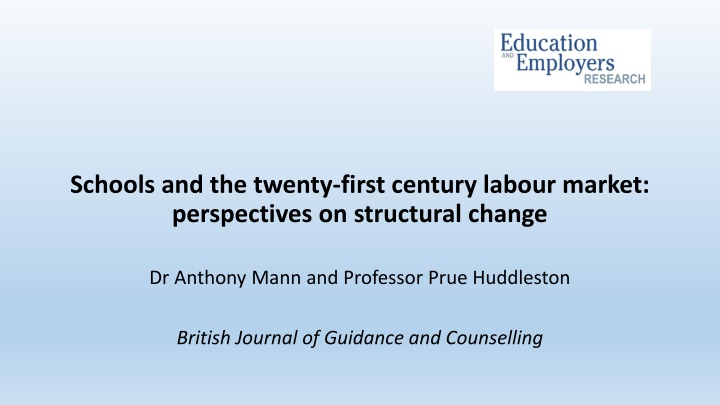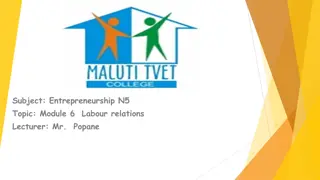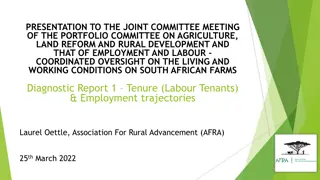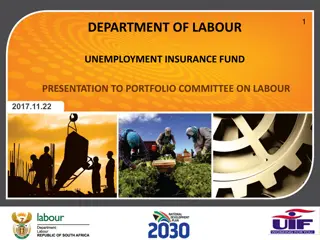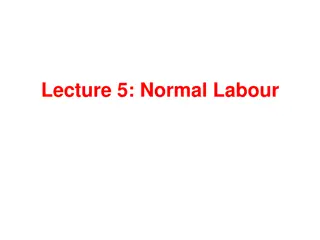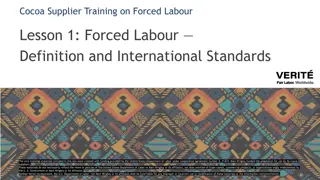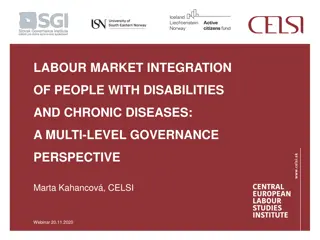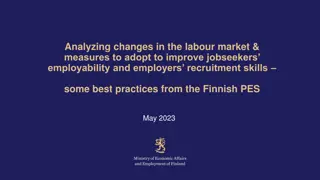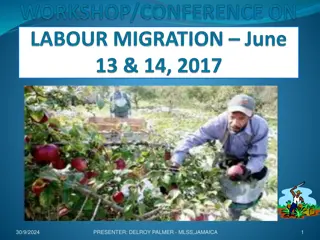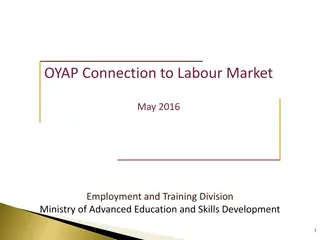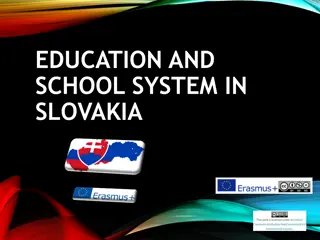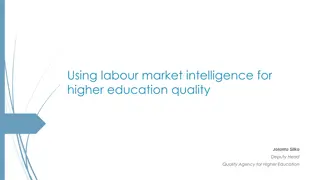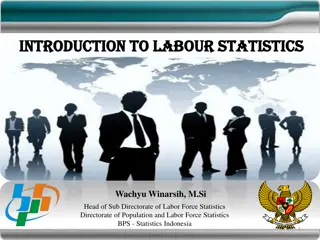Schools and the twenty-first century labour market: perspectives on structural change
Young people today are more qualified than ever, yet face discrimination in the labour market. This research delves into the structural changes affecting education and workforce dynamics.
Download Presentation

Please find below an Image/Link to download the presentation.
The content on the website is provided AS IS for your information and personal use only. It may not be sold, licensed, or shared on other websites without obtaining consent from the author.If you encounter any issues during the download, it is possible that the publisher has removed the file from their server.
You are allowed to download the files provided on this website for personal or commercial use, subject to the condition that they are used lawfully. All files are the property of their respective owners.
The content on the website is provided AS IS for your information and personal use only. It may not be sold, licensed, or shared on other websites without obtaining consent from the author.
E N D
Presentation Transcript
Schools and the twenty-first century labour market: perspectives on structural change Dr Anthony Mann and Professor Prue Huddleston British Journal of Guidance and Counselling
Research context Young people have never left education more highly qualified, with more years of schooling Any 5 GCSEs 1990/91 37% % in FT education @ 17 1990/91 43% 2011/12 81% 2013/14 77% http://researchbriefings.parliament.uk/ResearchBriefing/Summary/SN04252 https://www.gov.uk/government/uploads/system/uploads/attachment_data/file/436526/Main_t ext_16-18_participation_SFR19_2015.pdf; http://researchbriefings.parliament.uk/ResearchBriefing/Summary/SN04252 5 GCSES inc. English+Maths 1995/96 35% % of UK workforce with degree 1992 17% 2015/16 59% 2013 38% https://www.gov.uk/government/uploads/system/uploads/attachment_data/file/4 67603/SFR37_2015.pdf; https://www.gov.uk/government/uploads/system/uploads/attachment_data/file/5 59919/SFR48_2016.pdf https://www.ons.gov.uk/employmentandlabourmarket/peopleinwork/employmentandemployeet ypes/articles/graduatesintheuklabourmarket/2013-11-19
Research context but are facing record levels of discrimination in the labour market, seen in the ratio of youth:adult unemployment https://www.gov.uk/government/uploads/system/uploads/attachment_data/file/326119/14.07.02._Youth_Report_for_web_V3.pdf
Research context comparative earnings and success in Apprenticeship recruitment. http://www.if.org.uk/wp-content/uploads/2014/02/Squeezed-Youth_Final.pdf; http://researchbriefings.parliament.uk/ResearchBriefing/Summary/SN06113
Methodology Interviews with policy commentators Kay Carberry, Assistant General Secretary, Trades Union Congress (TUC) Peter Cheese, Chief Executive of the Chartered Institute of Personnel and Development Chris Husbands, Director of UCL Institute of Education Ewart Keep, Chair of Education, Training and Skills at the University of Oxford Hugh Lauder, Professor of Political Economy at the University of Bath and Editor of the Journal of Education and Work David Pollard, head of Education and Skills at the Federation of Small Businesses Andreas Schleicher, Director of Education and Skills, Organisation for Economic Co-operation and Development (OECD) Lorna Unwin, Professor of Vocational Education at the UCL Institute of Education and Editor of the Journal of Vocational Education and Training
Methodology Focus groups with recruiters Twenty five representatives: experienced recruiters Sourced through CIPD and EET networks Variety of sizes and sectors Three events: London and Leicester Semi-structured questioning
Three themes emerged from discussions Structural changes in the operation of the youth labour market (driven by technological change, globalisation, labour market deregulation, inequality and marketization of higher education and training) have implications which schools and colleges can do something about relating to: (1) Complexity: The increasing complexity of the labour market has required greater levels of more authentic careers provision. (2) Competition: School to work transitions have become more fractured with young people demanding that they leave education with greater levels of recruitment skills and resilience to compete for employment. (3) Workplace Change: A rapidly growing number of jobs demand not just knowledge itself, but its effective application in new situations, drawing on skills often delivered by schools as enterprise education.
Theme one: the implications of growing complexity If we think of young people making investment decisions as they decide on the qualifications, training and experience (collectively, the human capital) they plan to accumulate prior to leaving education to optimise their ultimate earnings in the labour market, we need to recognise the importance of access to good information about what that labour market actually wants and demands in order for properly informed decision making to take place. In the absence of good labour market signalling, it can be no surprise that poor investment decisions will be made and the widely evidenced skills mismatches in the British economy become a predictable result. Hugh Lauder.
Theme one: the implications of growing complexity It is absolutely apparent that if we want to do anything to make transitions into an increasingly complex working world easier for young people, it is essential that high quality careers information advice and guidance is available. Without that, we might as well give up, it is that important. We need to help young people become far more discerning consumers of the provision available to them. Ewart Keep.
Theme one: the implications of growing complexity Even some post-graduates are spectacularly na ve. They ve just done years studying mechanical engineering and when it comes to interview it turns out that they are not actually interested in working in mechanical engineering! FG. Young people do the course which is funded, not the course which is best for the job. The advice they get isn t smart enough. FG. All they ve got to do is let us in and tell their young people about what we do. And it needs to be done at the right time. When they re about to leave it s too late. We need to come in 2 3 years before they pick their options FG. Work experience should be compulsory and more structured. Young people, they need more exposure to the workplace and different jobs. Work experience is great at showing them what they would get if they went into this job or that job and what would be expected. FG.
Theme one: the implications of growing complexity Summary Jobs are changing and rapidly, making it harder for young people to relate their educational choices to employment ambitions, enhancing risk of skills mismatch and young people getting caught out Marketization of higher education and training can be expected to further distort signaling Enhanced careers provision enriched by multiple first-hand experiences of the labour market addresses growing complexity
Theme two: the implications of growing competition Over the last generation, employers have become spoiled for choice competition for employment has been so great that employers can, and do, impose increasingly demanding barriers to entry. It has become the norm for employers to operate in ever more flexible labour markets where they feel fewer and fewer responsibilities to train new staff. They have the choice of hiring in older workers with experience, migrants and of recruiting graduates to non-graduate jobs, as we see in some call centres now, and have taken it. Schools and colleges simply cannot give young people the degree of job readiness demanded by a growing number of employers. Ewart Keep.
Theme two: the implications of growing competition The policy emphasis on staying on and HE expansion has precluded attention to other routes. It has also led to a displacement problem those with higher level qualifications are now doing intermediate level jobs. The increase in supply of graduates is out of kilter with the level of demand. There is simply a mismatch between supply and demand. Lorna Unwin. Young people don t know what they want to do in life. Schools don t sit down with them to talk about jobs, what they have to offer and how work works. They don t understand how to apply for a job, what CVs should look like, how to get themselves a job. FG.
Theme two: the implications of growing competition Technological change has now made it possible for a young jobseeker to send out hundreds of CVs every day in search of employment and we hear terrible stories of despairing young people who have applied for countless jobs without any success while employers have to deal with thousands of people applying for vacancies. The bureaucratisation of recruitment catches young people out.. This is not the way that people optimise their chances of getting jobs. Most jobs are found through informal contacts, job centres and well researched targeted approaches. Through their behaviour, it is clear that very many young people just don t get how recruitment actually works and there is a real need for schools to step up and give them better advice. Peter Cheese.
Theme two: the implications of growing competition Summary Young people are facing greater competition for entry level employment They are less able to draw on personal contacts to secure early employment Schools and colleges need to do more to help them understand recruitment, how hard the early labour market can be (resiliency and information) and prepare them practically for recruitment competitions
Theme three: the implications of workplace change I suppose the thing is the young people do have lots of skills, but they re not necessarily skills we recognise because we don t ask for them. FG. It would be true to say that small businesses feel that the gap between what young people leave education with, and what they most value, is growing ever larger. At the heart of the gap, are employability skills. By this I don t mean technical ability, literacy or numeracy; though the quality of workplace functional skills is a concern. The skills our members have identified are the interpersonal skills needed to function well in the working environment: these include attitude and willingness to work, a desire for responsibility, teamwork and problem solving. David Pollard.
Theme three: the implications of workplace change What C21 employers increasingly value: The ability to be personally effective in applying knowledge to solve new problems. Andreas Schleicher.
Theme three: the implications of workplace change entrepreneurship education is much more important now than it was a generation ago because it teaches those skills and personal attributes which oil the modern labour market. It should be.. written into every subject. The art of being enterprising solution- focused attitudes, spotting opportunities, connecting dots and dealing with uncertainties. The great goal of such teaching is not in ensuring deep conceptual understanding as an end in itself, important as that is, but in fostering the ability of young people to apply the knowledge they have accumulated in new situations. In this way, we give them the confidence and intellectual resource to embrace and deal with the myriad unfamiliar problems they will encounter through life. Andreas Schleicher.
Theme three: the implications of workplace change The labour market demands new recruits who are able to take initiative and make things happen; young people with grit and resiliency, who will stick at things, work well with different people and do not give up. In pedagogic terms, there are tried and tested means of teaching young people to apply emerging knowledge in unfamiliar contexts. Enterprise styles of learning are considerably more effective if they engage real people from real workplaces in their delivery. Chris Husbands.
Theme three: the implications of workplace change Summary The C21 labour market increasingly demands new recruits to be personally effective in applying knowledge in new situations Young people are entering the labour market with limited experience of what employers increasingly value Schools and colleges need to respond by embedding enterprise/applied learning styles, rooted in real world experiences, into teaching and learning across the curriculum
Thank you Dr Anthony Mann (Education and Employers) Anthony.Mann@educationandemployers.org Professor Prue Huddleston P.J.Huddleston@warwick.ac.uk Links http://www.tandfonline.com/doi/abs/10.1080/03069885.2016.1266440?journalCode=cbjg20 http://www.educationandemployers.org/research/how-should-our-schools-respond-to-the- demands-of-the-twenty-first-century-labour-market-eight-perspectives/ http://www.educationandemployers.org/research/what-do-recruiters-think-about-todays-young- people-insights-from-four-focus-groups/
